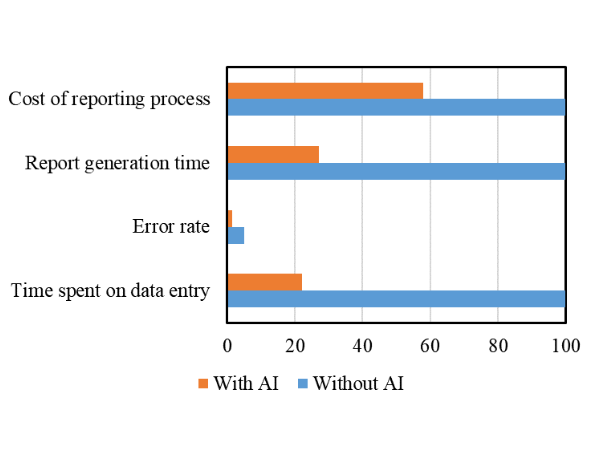AI-Driven Financial Reporting and Risk Management: A Path to Economic Growth and Market Efficiency
DOI:
https://doi.org/10.5281/zenodo.13765776ARK:
https://n2t.net/ark:/40704/AJSM.v2n5a05References:
21Keywords:
Artificial Intelligence (AI), Financial Reporting, Risk Management, Economic StabilityAbstract
Recent advances in Artificial Intelligence (AI) are having a tremendous effect on the financial industry, particularly in areas of reporting and risk management. Literature research makes it evident that artificial intelligence technologies are revolutionizing how financial information is collected, analyzed and disseminated to enhance accuracy and decision-making processes. In this paper we investigate AIs transformative role in financial reporting and risk management. This paper addresses how AI may assist the U.S. economy by improving efficiency, accuracy and economic stability. Furthermore, ethical considerations and regulatory challenges associated with its use in finance are discussed; our findings indicate that while AI offers significant benefits, careful management is required in order to mitigate its potential risks while increasing positive effects upon growth and stability of economic systems.
Downloads
Metrics
References
Kokina, J., & Davenport, T. H. (2017). The emergence of artificial intelligence: How automation is changing auditing. Journal of Emerging Technologies in Accounting, 14(1), 33-46. https://doi.org/10.2308/jeta-51755
Hirtle, B., Kovner, A., & Vickery, J. (2018). The Supervisory Capital Assessment Program. Federal Reserve Bank of New York Staff Reports, 899.
PwC. (2018). The macroeconomic impact of artificial intelligence. Retrieved from https://www.pwc.co.uk/economic-services/assets/macroeconomic-impact-of-ai-technical-report-feb-18.pdf
Financial Stability Board. (2017). Artificial intelligence and machine learning in financial services. Retrieved from https://www.fsb.org/wp-content/uploads/P011117.pdf
Zetzsche, D. A., Arner, D. W., Buckley, R. P., & Weber, R. H. (2020). Artificial intelligence in finance: Putting the human in the loop. Sydney Law Review, 42(4), 443-474.
Kokina, J., & Davenport, T. H. (2017). The emergence of artificial intelligence: How automation is changing auditing. Journal of Emerging Technologies in Accounting, 14(1), 33-46. https://doi.org/10.2308/jeta-51755
Deloitte. (2020). How robotics and cognitive automation will transform the insurance industry. Retrieved from https://www.deloitte.com/content/dam/Deloitte/mt/Documents/rpa/mt-cons-how-robotics-and-cognitive-automation-will-transform-the-insurance-industry.pdf
American Institute of CPAs (AICPA). (2021). The data-driven audit: How automation and AI are changing the audit and the role of the auditor. Retrieved from https://us.aicpa.org/content/dam/aicpa/interestareas/frc/assuranceadvisoryservices/downloadabledocuments/the-data-driven-audit.pdf
KPMG. (2023). The future of AI in finance. Retrieved from https://kpmg.com/us/en/articles/2023/cfo-peer-exchange-oct-2023.html
PwC. (2018). The macroeconomic impact of artificial intelligence. Retrieved from https://www.pwc.co.uk/economic-services/assets/macroeconomic-impact-of-ai-technical-report-feb-18.pdf
Financial Stability Board. (2017). Artificial intelligence and machine learning in financial services. Retrieved from https://www.fsb.org/wp-content/uploads/P011117.pdf
Juniper Research. (2022). AI in financial fraud detection: Key trends, competitor leaderboard & market forecasts 2022-2027. Retrieved from https://www.juniperresearch.com/research/fintech-payments/fraud-identity/ai-financial-fraud-detection-trends-report
Hirtle, B., Kovner, A., & Vickery, J. (2018). The Supervisory Capital Assessment Program. Federal Reserve Bank of New York Staff Reports, 899.
FICO. (2019). FICO score research: Explainable AI for credit scoring. Retrieved from https://www.fico.com/blogs/fico-score-research-explainable-ai-credit-scoring
Accenture. (2018). How AI boosts industry profits and innovation. Retrieved from https://blog.worldsummit.ai/how-ai-boosts-industry-profits-and-innovation
Bank of England. (2022). Machine learning in UK financial services. Retrieved from https://www.bankofengland.co.uk/report/2022/machine-learning-in-uk-financial-services
CFA Institute. (2019). Investment professional of the future. Retrieved from https://futureprofessional.cfainstitute.org/wp-content/uploads/2019/07/Investment-Professional-of-the-Future-FoF_Rev.pdf
O’Neil, C. (2016). Weapons of math destruction: How big data increases inequality and threatens democracy. Crown.
Zetzsche, D. A., Arner, D. W., Buckley, R. P., & Weber, R. H. (2020). Artificial intelligence in finance: Putting the human in the loop. Sydney Law Review, 42(4), 443-474.
Securities and Exchange Commission (SEC). (2024). AI, behavioral prompts, and other emerging technology. Retrieved from https://www.sec.gov/files/outline-iaa-conference-ai-behavioral-prompts.pdf
International Monetary Fund. (2019). The rise of digital money. Retrieved from https://www.imf.org/en/Publications/fintech-notes/Issues/2019/07/12/The-Rise-of-Digital-Money-47097

Downloads
Published
How to Cite
Issue
Section
ARK
License
Copyright (c) 2024 The author retains copyright and grants the journal the right of first publication.

This work is licensed under a Creative Commons Attribution 4.0 International License.

















